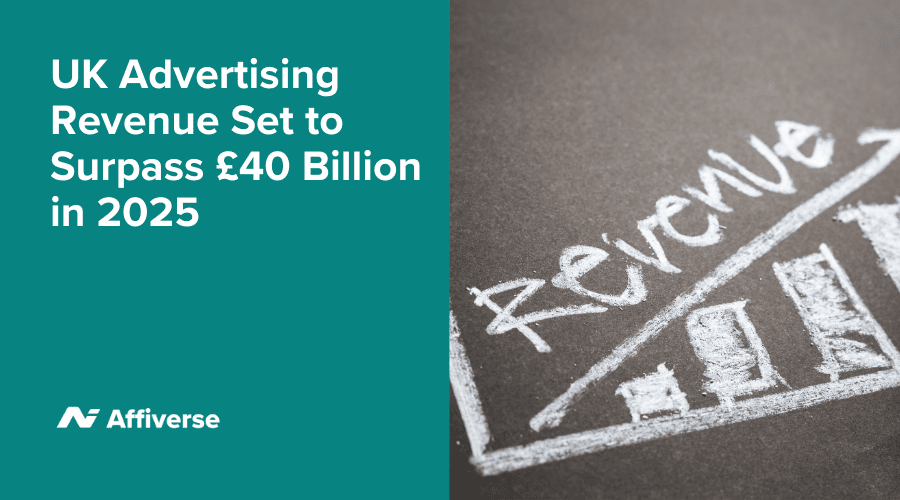UK Advertising Revenue Set to Surpass £40 Billion in 2025

The UK advertising industry is on track to exceed £40 billion in revenue next year, a milestone driven almost entirely by the rapid growth of digital advertising. According to a recent forecast by GroupM, digital channels are expected to account for 81% of this total, solidifying their position as the driving force behind the UK’s advertising economy.
This projection highlights a seismic shift in the industry as brands prioritise online platforms over traditional methods, with mobile, social media, and video advertising at the forefront of this growth.
The Digital Dominance
Digital advertising’s dominance is no surprise. Over the past decade, brands have steadily moved budgets away from print, TV, and outdoor campaigns to focus on online platforms where consumers now spend most of their time. Mobile usage has skyrocketed, streaming services have replaced traditional TV for many households, and social media platforms continue to evolve into sophisticated marketing hubs.
This shift is reflected in where advertisers are investing. Platforms like Google, Meta, TikTok, and Amazon have carved out substantial market share, offering brands highly targeted, data-driven opportunities to engage consumers. The ability to measure returns, track consumer behaviour, and personalise messages has made digital advertising a more appealing choice for businesses of all sizes.
According to GroupM’s report, digital advertising is forecast to reach its highest share yet of the UK market in 2025, with areas like programmatic advertising, short-form video, and influencer-led campaigns showing the fastest growth.
Why Brands are Betting Big on Digital
Several factors are pushing brands to invest more in digital advertising:
- Measurable Performance: Unlike traditional media, digital platforms offer clear metrics. Brands can track impressions, clicks, conversions, and returns in real time, allowing for better optimisation of campaigns and budgets.
- Personalisation and Targeting: The ability to use data to reach the right audience has been transformative. Whether through search ads, social media targeting, or programmatic buying, digital channels allow advertisers to deliver highly tailored messages to specific demographics.
- The Rise of Video and Social Media: Short-form video content, particularly on platforms like TikTok, Instagram Reels, and YouTube, has exploded in popularity. Advertisers are leveraging these platforms to create engaging, entertaining campaigns that resonate with younger audiences.
- E-commerce Integration: Platforms like Instagram Shopping and TikTok Shop have blurred the line between advertising and retail, making it easier than ever for consumers to purchase directly through ads. This seamless experience boosts conversion rates and makes digital campaigns more valuable.
A Growing Gap Between Traditional and Digital
While digital advertising soars, traditional formats like print, TV, and radio continue to decline. GroupM’s data shows that print advertising has seen the sharpest drop, with many newspapers and magazines struggling to retain ad revenue as readership moves online.
Television advertising, once the gold standard for brands, is also under pressure. The growth of streaming services and on-demand content has reduced the effectiveness of traditional TV ads. While broadcasters are exploring digital alternatives—such as addressable TV advertising—the overall spend on TV campaigns is expected to stagnate in the coming years.
Outdoor and radio advertising remain resilient, especially for local and event-driven campaigns, but their share of the market is dwarfed by digital.
The Role of AI and Technology
Another key driver of growth in the UK advertising market is the increasing use of artificial intelligence and automation. AI tools are revolutionising campaign creation, audience targeting, and performance analysis.
Brands are now using machine learning algorithms to predict consumer behaviour, automate ad placements, and personalise messaging at scale. AI also enables dynamic creative optimisation, where campaigns are adjusted in real time based on performance data. This level of precision is helping brands maximise returns and reduce waste in their ad budgets.
Additionally, advancements in AI-generated content have made it easier for brands to produce large-scale campaigns quickly. From video production to ad copywriting, technology is allowing advertisers to be more agile and responsive to trends.
What This Means for Brands and Marketers
The forecasted growth in UK advertising revenue signals a significant opportunity for brands and marketers. Digital advertising’s dominance means businesses must continue to focus on online strategies to remain competitive.
For smaller businesses, digital platforms provide affordable access to tools that were once only available to large corporations. Programmatic advertising and social media campaigns allow brands of all sizes to target their ideal audiences with measurable results.
Meanwhile, large brands will need to innovate and experiment with emerging trends like influencer marketing, livestream shopping, and AI-driven content. Staying ahead of the curve will be essential as competition intensifies.
Looking Ahead
The UK’s advertising industry crossing the £40 billion mark is more than just a financial milestone—it’s a reflection of how the digital economy has reshaped consumer behaviour and brand strategy. As technology continues to advance and digital platforms dominate, the role of traditional advertising will further diminish.
For brands willing to embrace data, AI, and the power of personalisation, the opportunities are vast. The UK remains one of the world’s most sophisticated and competitive advertising markets, and those who adapt to its changing dynamics will be well-positioned for success in 2025 and beyond.






